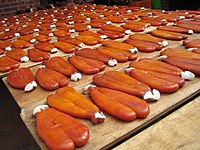Chinmi

Chinmi (珍味) is a Japanese term meaning literally "rare taste", but more appropriately "delicacy". They are local cuisines that have fallen out of popularity or those cuisines that are peculiar to a certain area. Many involved pickled seafood. The three best known chinmi of Japan are salt-pickled sea urchin roe (uni), salt-pickled mullet roe (karasumi) and pickled sea cucumber innards. (konowata).
List of chinmi
Hokkaidō Area
- Hizunamasu
- Ikanankotsu - Cooked soft bones of squid
- Kankai - Dried Komai fish. It may be eaten as is, or broiled and eaten with a sauce made by mixing mayonnaise and soy sauce and sprinkles of red pepper powder.
- Kirikomi
- Matsumaezuke
- Mefun
- Saketoba - A smoked salmon
- Tachikama
- Uni
Tohoku area
- Awabi no Kimo - Ground internal organs of abalone
- Donpiko - The heart of a salmon. As only one can be taken from a fish, it is very rare.
- Hoya - sea pineapple
- Momijizuke - Shreds of fresh salmons and Ikura pickled together
- Tonburi - A speciality of Akita prefecture. The dried seeds of the hosagi plant.
Kanto area
- Ankimo - Either fresh or steamed liver of an Anko fish
- Chikuwabu
- Kusaya - Dried and pickled fish of Izu islands
Chūbu area
- Fugu no Ranso no Nukazuke - detoxed blowfish ovary in rice-bran
- Hebo
- Ika no Maruboshi
- Inago no Tsukudani
- Konowata
- Kuchiko
- Kurozukuri
- Zazamushi
Kinki area
Chūgoku area
Shikoku area
Kyūshū area
- Ganzuke (Saga)
- Karashi Mentaiko (Fukuoka)
- Karashi Renkon (Kumamoto)
- Karasumi (Nagasaki)
- Okyuto (Fukuoka)
Okinawa area
- Tofuyo
- Umibudo - A type of edible seaweed with tiny seeds that hangs from its stems
